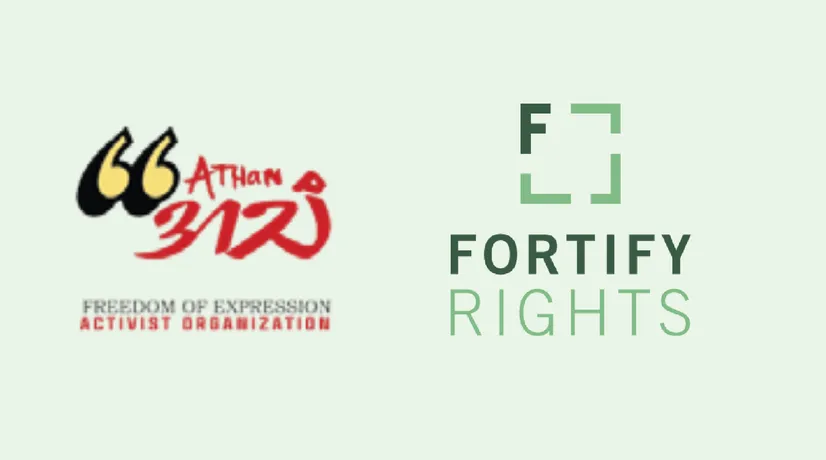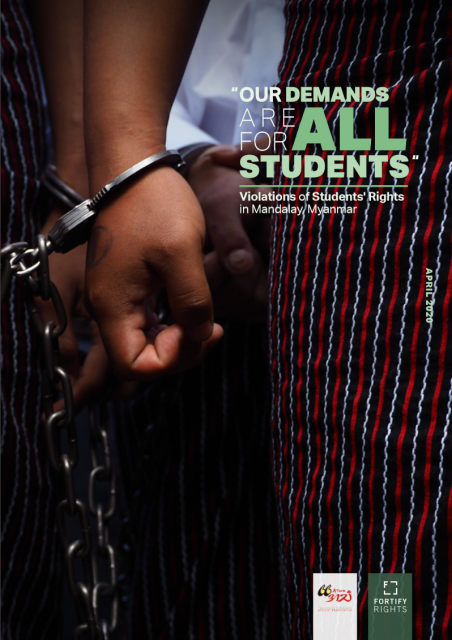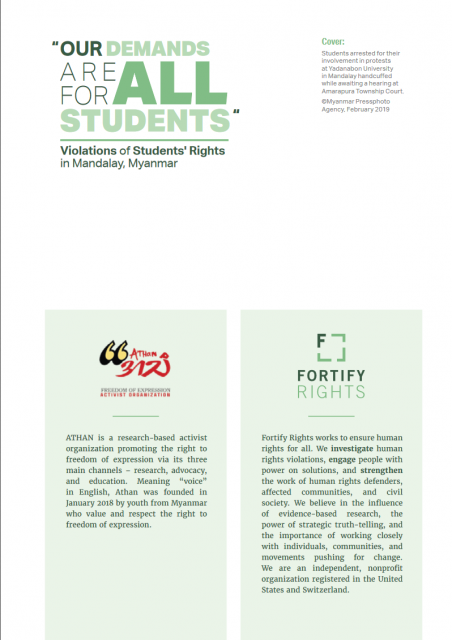Our Demands are for All Students: Violations of Students’ Rights in Mandalay, Myanmar



Summary
There are more than 180 political prisoners in Myanmar today. Since 2015, Myanmar authorities released more than 740 political prisoners—more than half of whom served out their sentences in full, and the authorities freed the remainder through mass amnesties that failed to acknowledge the arbitrary nature of their detention. The Government of Myanmar has failed to provide remedies or justice for former political prisoners.
Activists, students, journalists, and others in Myanmar continue to face imprisonment or threats of detention for exercising their rights, and the government continues to use vague or flawed laws to crack down on basic freedoms, including the rights to freedom of expression and peaceful assembly.
This report highlights one case that is representative of many.
At 1 p.m. on December 28, 2018, a small group of university student activists set fire to a makeshift cardboard coffin containing photos of government and university officials before a crowd of more than 100 students, university officials, and others gathered outside the main gate of Yadanabon University in Mandalay, Myanmar. The mock funeral was part of a planned protest for improved security measures for students following a series of student murders in Mandalay and to bring attention to the students’ concerns regarding the administration of the university. It was a peaceful demonstration.
Plainclothes police officers quickly dispersed the crowd and arrested three students who led the demonstration—Myo Chit Zaw, 18, Ye Min Htun, 23, and Kyaw Thiha Ye Kyaw, 23. Five days later, Myanmar authorities arrested four more students—Ye Myo Swe, 23, Phone Myint Kyaw, 20, Ye Lin Aung, 20, and Nay Win Kyaw, 22—for organizing a protest to demand the release of the three student leaders detained on December 28. On February 13, 2019, the Amarapura Township Court sentenced all seven students to three months in prison for arson and failing to provide advanced notice of the demonstration to the authorities.
The students spent more than 80 days in Mandalay’s Obo Prison before being released. Four of the students reported that prison guards beat them in detention.
The December 28 protest and subsequent events were months in the making, culminating at a time of increased restrictions on protest activities by government and university officials. Before the students’ demonstration in Mandalay, between November 13 and December 28, 2018, students at Yadanabon University involved with the All Burma Federation of Student Unions (ABFSU)—one of the main nationwide student organizations in Myanmar with a long history of political activism in the country—organized three peaceful protests. In each of these protests, Yadanabon University officials prevented the students from protesting on campus by either closing the gates of the university or stationing professors at the gate to stop protesters from entering the campus.
Nevertheless, the students continued to organize protests. “Our demands are not for us,” student activist Kyaw Thiha Ye Kyaw told reporters in January 2018. “Our demands are for all students.”
Between August and December 2018, three Yadanabon University students—Ko Nay Min Htet, 19, Htet Lin Thant, 18, and Soe Moe Hein, 20—were murdered in Mandalay. In response, the ABFSU students organized the aforementioned protests. University officials largely ignored the students’ demands for increased security and other improvements on campus. After the murder of Soe Moe Hein on December 25, the rector of the university told the protesting students: “We are all human. Humans can die.” In response, the students organized the mock funeral for the rector and other officials on December 28.
Athan and Fortify Rights conducted a joint investigation into the students’ case. As part of the investigation, Athan and Fortify Rights interviewed the seven students, eyewitnesses to the protests, Yadanabon University officials—including professors and administrators—members of ABFSU, and others.
The arrest, detention, and conviction of the student protesters took place amid continued restrictions on the rights to freedom of expression and peaceful assembly in Myanmar. The government continues to use the Peaceful Assembly and Peaceful Procession Law (hereafter “the Peaceful Assembly Law”)—the law that the Myanmar authorities charged the Yadanabon University student leaders with violating—to impose reprisals on and attempt to silence human rights defenders and activists. The overly broad provisions and criminal penalties of the Peaceful Assembly Law violate international human rights law.
The students’ protests, one of which involved setting fire to a mock coffin containing the photos of government and university officials, are protected forms of expression under international law. In a similar case, the European Court of Human Rights found that the act of burning photos should be interpreted as “the symbolic expression of dissatisfaction and protest” and that “freedom of expression extended to ‘information’ and ‘ideas’ that offended, shocked or disturbed.” Several jurisdictions have similarly found such symbolic acts to constitute protected expression.
Download full report in English and Burmese.
၎
င
၎
၎
၎
င
၎
၎
၎
င
၎
၎
Announcements
28 February 2025
Asian NGO Network on National Human Rights Institutions , CSO Working Group on Independent National Human Rights Institution (Burma/Myanmar)
Open letter: Removal of the membership of the dis-accredited Myanmar National Human Rights Commission from the Southeast Asia National Human Rights Institution Forum

Progressive Voice is a participatory rights-based policy research and advocacy organization rooted in civil society, that maintains strong networks and relationships with grassroots organizations and community-based organizations throughout Myanmar. It acts as a bridge to the international community and international policymakers by amplifying voices from the ground, and advocating for a rights-based policy narrative.